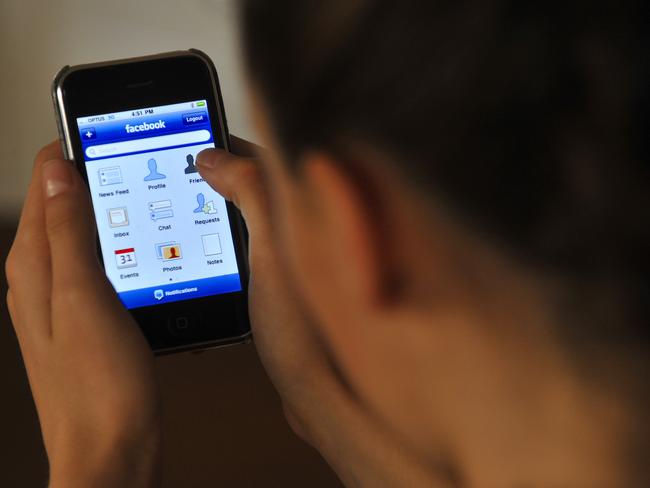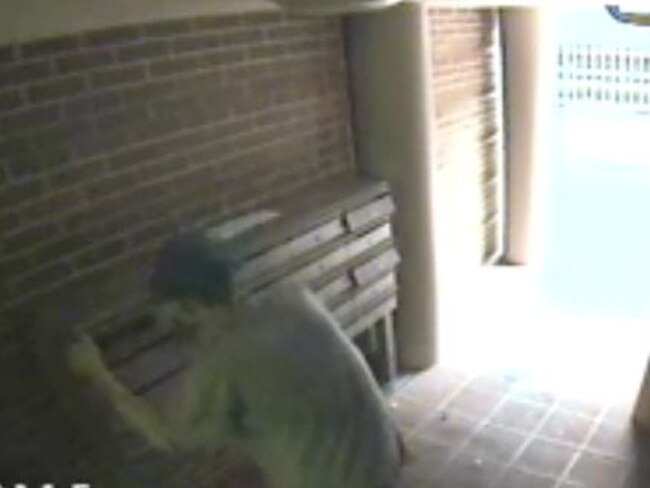Mail theft leaves Sydney woman struggling to get her life back
THINK it couldn’t happen to you? Paula Mills watched someone take over her life and realised too late that it was surprisingly easy.
Banking
Don't miss out on the headlines from Banking. Followed categories will be added to My News.
BY THE time Paula Mills realised something was wrong, it was too late.
The Sydney woman was already caught up in a nightmare scenario that led to her being locked out of her bank accounts and borrowing money from her parents and boyfriend to pay her bills.
The problem was, someone had been able to steal her identity simply by taking her mail, a crime that has been on the rise, especially in apartment blocks. Victims have seen their credit ratings left in tatters and can struggle for years to reclaim their identity.
Ms Mills’s ordeal began on November 20 when she noticed her mobile phone had no signal. But she didn’t become worried until the next morning when she saw a newspaper report taped up in a lift that warned of mail theft.
She rushed to her letterbox, which she had not opened in weeks, and there was nothing in it.
Ms Mills immediately rang her mobile phone provider Optus and asked whether someone could have stolen her number. She was shocked to find out a new SIM had been issued for her phone the day before.
“Someone told me they gave a guy my number, they mustn’t have checked his ID, he was a guy so obviously it wasn’t me, I don’t know what story he must have told them,” Ms Mills told news.com.au.
She managed to get her number back but hours later it had been taken over again. The second time the person didn’t even have to go into a store — they just did it over the phone.
The thieves’ interest in her mobile phone was soon revealed after she started getting text messages providing PIN numbers to authorise bank payments that night.
Ms Mills had already informed Citibank in the morning that her mail had been stolen and asked for her account be suspended. But the bank’s response was frustratingly slow.
“I begged them for three or four days to please block my account, I made about 150 calls, I was calling them non-stop because I was getting text messages (about transactions) and I was locked out of my account.”
Ms Mills kept calling Citibank to check whether her account was suspended but no one ever called her back. She was also locked out of her online account so could not check what was happening. She found out days later that three withdrawals were able to be made over three days on her account, despite her numerous calls. She also visited several branches in Sydney to speak with someone about her case.
“No one called me back, it was ridiculous, I had no contact from Citibank until the media got involved two months later,” she said.
Ms Mills said she had warned Citibank of the potential identity theft about 12 hours before the first transactions were made. She became worried though when she started receiving text messages with PIN numbers to authorise payments. This happened for about 45 minutes before her phone went silent, which Ms Mills believes was when the thieves managed to take over her number for the second time, and to get the PIN codes.
Do you have a horror story about mail fraud or identity theft? Comment below.

Ms Mills said the thief stole about $18,000 from her account before it was shut down.
And despite her account being suspended since November, Citibank has started pursuing Ms Mills for another $3900 withdrawn from her account this year. At least some of these transactions were likely direct debits from health funds or insurance companies but Ms Mills said she did not understand how the money was able to be withdrawn from an account that was supposed to be frozen.
SLOW RESPONSE
Ms Mills is furious that her Optus and Citibank accounts have been so easily hacked despite her best efforts to warn the organisations about her identity being stolen.
She said she was also concerned at how easy it was for the thieves to take over her mobile phone number, especially as so many accounts were linked to people’s phones these days including emails and bank payments.
“They (Optus) gave my information to thieves, they made a mistake twice but they say it wasn’t their fault and that they had no proof I didn’t do it. Are you serious?”
Ms Mills found the only way to ensure her security was to change phone providers to one that required a PIN number for SIM swaps.
An Optus spokeswoman said its fraud department had investigated Ms Mills’s case in February and confirmed there was no breach of its internal policies and procedures.
“Optus was also unable to confirm the identity of the perpetrator,” she said, when asked whether it was a man who took over Ms Mills account.
Ms Mills said she was told that the thief’s name was simply noted down as “Carlo”. His identity was likely not recorded because it is not necessary to provide proof of identity in order to swap a SIM card at Optus.
An Optus spokeswoman told news.com.au that to get a new SIM, an existing customer needs to pass an “identity check” which “may include name, address, service number and date of birth”. Most of this information is readily available if you have someone’s phone bill. Finding a person’s date of birth could be as easy as going through their Facebook account.

Citibank has reimbursed Ms Mills for the illegal payments but she said no one from the bank contacted her until she complained to the media two months later. More than six months since the theft she is still in ongoing negotiations with Citibank over further transactions made on her account, which was supposed to be frozen.
She said no one from Citibank even bothered to contact her to let her know the money had been refunded, they just transferred the amount to her account.
A spokesman for Citibank said Ms Mills had been “refunded in full and the account was frozen once the fraud had been detected”.
It did not respond to questions about why payments were able to be made on the account even after Ms Mills requested it be suspended, but said: “Citibank places the highest importance on the detection and prevention of fraud. We have in place a number of processes and controls to identify fraud which are constantly reviewed and updated to ensure our clients are protected. We also regularly remind our clients to check their accounts on a regular basis including setting up account alerts to quickly identify fraudulent activity.”
MAILBOXES ARE AN EASY TARGET
Mailboxes have become an easy target for thieves who find breaking into them relatively simple. Some have even managed to get hold of master keys to access the mail of every apartment.
“Because they are using the master key, the residents don’t even know if they are the victims and by the time they do, it’s usually quite late — when the credit card bills have been racked or personal credit ratings affected,” Marc Cohen, managing director of Carbine, said.
Mr Cohen has designed a lock individually coded to each mailbox so that it cannot be accessed by a generic master key. It is just one way apartments are trying to deal with a problem that is not easily solved.
Strata manager Pia Cunningham, from Strata Title Management, looks after 3000 apartments in Sydney and said complaints about mail theft had increased fourfold in the past two years.
She said she probably received about five complaints a week, mostly from residents in south western suburbs, the north shore and northern beaches.
“I think its because people realise they can get away with it (mail theft). People wave at CCTV cameras and unless we know who they are, we can’t do anything about it.”
She said some apartments had installed heavy duty locks on mailboxes but even some of these could be popped open with a screwdriver.
And calls to get mailboxes moved into apartment foyers were being met with resistance by Australia Post.

“Steal from dwelling” is the only criminal category that saw an increase in NSW in the two years in December 2014, according to the NSW Bureau of Crime Statistics and Research.
“That’s mainly attributed to mail theft,” North Sydney Police crime manager Detective Inspector Mike Birley told the Mosman Daily.
The areas that showed significant increases were in North Sydney and Hornsby, where offences were up by 37.5 per cent, and Ryde, up by 45 per cent.
PROTECT YOURSELF
Neil Mitchelhill, a former director at Crime Stoppers NSW, said some people did not even take the most basic measures to protect against identity theft such as putting a lock on their mailbox, shredding their mail and placing important documents, including their passport, in a lockbox.
“Once your identity has been stolen it’s next to impossible to get back, unfortunately it’s hard to prove whether your identity was stolen or whether you have done something wrong yourself,” Mr Mitchelhill said.
“It’s a very real possibility that it will impact your ability to buy home, or start a business because how can you prove the difference between yourself and someone else?”
And even if you get money refunded from the theft, who knows what someone might do with your personal details going forward.
“Victims can struggle to recover for years and many don’t fully recover from the implications to their credit history. There is also a sense of shame involved too in admitting this has happened to you, especially for older persons.”
Tips for keeping your identity safe:
• If you buy a new home, get the locks changed to ensure previous tenants cannot access the property
• Buy a simple home safe to put your bank statements and passport in case someone does break in
• Make sure your letterbox is secure, even if you just place a simple padlock on it so people can’t just take mail out
• Check your mail every day
• Buy a shredder and use it to destroy documents that contain personal information such as bank statements and power bills etc.
• Check your credit card statements for any strange transactions
• Consider collecting bank details, statements, cheque books etc from a branch. If you don’t like the inconvenience consider a PO Box
• Never send money or give personal details to people you don’t know and trust
• If you receive a call from your bank or any other organisation, don’t provide your personal details — instead ask for their name and a contact number. Check with the organisation in question before calling back. Never rely on a number provided in an email or click on the provided link — instead find the contact number through an internet search or check the back of your ATM card
• If you receive a request from a friend or family member stranded while on holiday asking you to transfer money to them, contact them by phone or an alternative contact to verify the request is genuine before sending any money or providing personal details
• Log directly onto websites you are interested in rather than clicking on links provided in an email
• If you think your identity has been stolen, take a record any unfamiliar numbers on your phone so you can report suspicious activity to the authorities
• Alert police and your mobile phone or banking provider if you think you could be the victim of a scam
• For more information go to SCAMwatch
Originally published as Mail theft leaves Sydney woman struggling to get her life back


